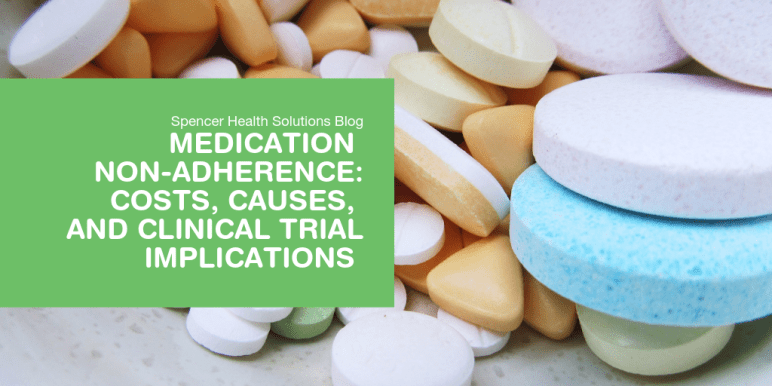By Alan Menius, Spencer Health Solutions

Medication nonadherence is a widespread problem in medicine, leading to increased costs throughout the health industry. From worsened health outcomes to extended clinical trials to lost sales, the industry takes a big financial hit when people don’t take their medications properly.
In real-world scenarios, as much as 50 percent of people don’t take their medications as prescribed. This can mean missing doses, cutting pills in half or simply not taking them. Those habits are estimated to cost $300 billion in additional medical costs. Plus, drug companies lose sales to the tune of $250 billion lost, money that could be invested back in the development of new therapies.
Before a drug gets to market, nonadherence also affects the research investment needed. An estimated 40 percent of trial participants may stop taking the study drug properly within 5 months. That means the sample size needs to increase by 200 percent to maintain the same statistical power.
“In the pharmaceutical industry, adherence is a big deal,” said Alan Menius, Chief Scientific Officer at Spencer Health Solutions. “When you’re trying to prove a medication’s effectiveness, if you have patients who were supposed to be taking the investigational drug but aren’t, they become a member of the comparative group. Yet, the researcher doesn’t know that, and the effect of the drug seems to be smaller or the variability of the results is so vague, you can’t make a conclusion.”
Reasons for Nonadherence
Many people would assume cost is a driving factor in nonadherence, and it’s one of them, but it’s far from the only contributing factor. In trials and the real world, the complexity of the medication regimen, transportation to obtain the medication, confusing labels, side effects, timing, and lifestyle disruption all lead people to put off their medications.
Complexity and confusing labels can lead to worsening outcomes and non-adherence even for people who are trying their best. The Agency for Healthcare Research and Quality (AHRQ) estimates that about 12 percent of adults have proficient health literacy, meaning they can correctly interpret what’s on their prescription label.
The more medications a person takes and the lower their literacy, the higher the probability of a mistake.
How to Address Nonadherence
A wave of technology solutions to address nonadherence has hit the market, from “smart” pill caps or pillboxes to dispensing solutions to the more futuristic option of a sensor implanted in the pill. These technologies are promising. One of them, the spencer® Smart Hub, which dispenses pre-packaged medications with a patient-friendly interface, has an adherence rate of 95 percent across its users. The device provides reminders and dispenses the medication, ensuring the individual receives the right medications at the right time and at the right dose. No need to decipher confusing labels.
This technology also stands to disrupt the clinical trial process in a positive direction. Earlier this year, the Food and Drug Administration issued a statement on ways to modernize clinical trials. Research is costly and time-consuming, but emerging technologies can streamline the process and reduce costs.
Decentralized trials using mobile technologies stand to widen the participant pool and speed development, but they require innovative protocols. Although siteless trials can be easier for the patients by reducing or eliminating cumbersome clinic visits, engagement is still critical to continued adherence to the study. For technology to be successfully applied, it can’t simply be a tool to dispense drugs or information, it must also connect with patients to keep them actively involved.
That’s where tools like spencer provide a full solution. Spencer dispenses medication, asks health status questions and provides telehealth links, so patients can video chat with the research team if they’re at risk of dropping out or simply confused about what they should be doing.
As the FDA supports innovative trial designs and pharmaceutical companies seek ways to bring new trials to market faster at lower costs, technology that makes the patient experience easier and supports the research goals is poised to change the landscape.
